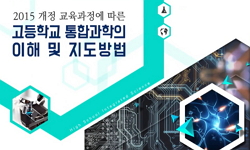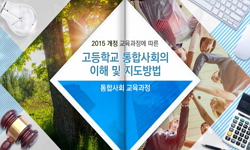The quality of school education is a key element for national education development. An important factor that determines the quality of school education is qualities of teachers who are in responsible for school education in the field. Therefore, it i...
http://chineseinput.net/에서 pinyin(병음)방식으로 중국어를 변환할 수 있습니다.
변환된 중국어를 복사하여 사용하시면 됩니다.
- 中文 을 입력하시려면 zhongwen을 입력하시고 space를누르시면됩니다.
- 北京 을 입력하시려면 beijing을 입력하시고 space를 누르시면 됩니다.

중등교사 임용후보자선정경쟁시험 표시과목인 전기․전자․통신의 평가영역 및 내용요소 개발․보완 연구 = Development and Complementation of Evaluation Area and Content Elements in Electrical, Electronics and Communications Subject
한글로보기https://www.riss.kr/link?id=A106105752
- 저자
- 발행기관
- 학술지명
- 권호사항
-
발행연도
2019
-
작성언어
Korean
- 주제어
-
등재정보
KCI등재후보
-
자료형태
학술저널
- 발행기관 URL
-
수록면
52-71(20쪽)
-
KCI 피인용횟수
0
- DOI식별코드
- 제공처
-
0
상세조회 -
0
다운로드
부가정보
다국어 초록 (Multilingual Abstract)
The assessment area and content elements of “Electrical”, “Electronics”, “Communication are extracted from the analyzed results and they are verified by experts’ consultation and presented as follows; First, the assessment area and content elements of the “Electrical” subject were designed to evaluate the NCS - based 2015 revised curriculum by presenting the NCS learning module to the evaluation area and content element in the basic subject "Electrical and Electronics Practice".
Second, the section of “Electronics” presented the assessment area and content elements applying the Electronic Circuit, basic subject of the NCS and it also added “Electromagnetics”, which is the basic part of Electronics in the Application of Electromagnetic waves that could be applied to the assessment.
Third, the assessment area and content elements of “Communication” consist of the communication-related practice that is based on “Electrical” and “Electronic”, considering the characteristics of “Communication Engineering”. In particular, “Electrical and Electronics practice” which adds network construction practice and communication-related practice makes it to be able to evaluate the communication-related practical education.
The quality of school education is a key element for national education development. An important factor that determines the quality of school education is qualities of teachers who are in responsible for school education in the field. Therefore, it is necessary to hire competent teachers in the teacher appointment exam for the secondary school. This necessity is evident especially for vocational high schools and Meister high schools with the introduction of 2015-revised curriculum based on NCS that separates each three subjects, “Electrical, Electronics Communication” resulting in the change of question mechanism, which requires new designing of assessment and content area. So, this study analyzes curriculum in college of education for “Electrical”, “Electronics”, “Communication”, 2015-revised curriculum based on NCS and the development of standards for teacher qualifications and assessment area and evaluation of teaching ability in the subjects of the teacher appointment exam, “Electrical, Electronics Communication” Engineering” in 2009.
The assessment area and content elements of “Electrical”, “Electronics”, “Communication are extracted from the analyzed results and they are verified by experts’ consultation and presented as follows; First, the assessment area and content elements of the “Electrical” subject were designed to evaluate the NCS - based 2015 revised curriculum by presenting the NCS learning module to the evaluation area and content element in the basic subject "Electrical and Electronics Practice".
Second, the section of “Electronics” presented the assessment area and content elements applying the Electronic Circuit, basic subject of the NCS and it also added “Electromagnetics”, which is the basic part of Electronics in the Application of Electromagnetic waves that could be applied to the assessment.
Third, the assessment area and content elements of “Communication” consist of the communication-related practice that is based on “Electrical” and “Electronic”, considering the characteristics of “Communication Engineering”. In particular, “Electrical and Electronics practice” which adds network construction practice and communication-related practice makes it to be able to evaluate the communication-related practical education.
국문 초록 (Abstract)
분석된 결과를 기초로 전기, 전자, 통신 과목의 평가영역 및 내용요소를 추출하였다. 추출된 내용은 전문가 협의를 통해 검증한 후 다음과 같이 제시하였다.
첫째, “전기” 과목의 평가영역 및 내용요소는 “전기전자실습”의 기본이수과목에 NCS 학습 모듈을 평가영역 및 내용요소로 제시하여 NCS 기반의 2015 개정 교육과정을 평가할 수 있도록 구성하였다.
둘째, “전자” 과목의 평가영역 및 내용요소는 “전자회로”의 기본이수과목에서 NCS 기초과목인 전자회로를 활용하여 평가영역 및 내용요소를 제시하였으며 “전자파응용”과목에서 “전자기학”을 평가할 수 있도록 구성하였다.
셋째, “통신” 과목의 평가영역 및 내용요소는 기존의 “전기․전자” 기반에서 시작된 통신 관련 실습을 “통신”과목의 특성에 맞게 구성 하였으며 “전기전자실습”에서 NCS 실무과목인 네트워크 구축 실습과 통신 관련 실습 평가영역 및 내용요소에 제시하여 통신관련 실무능력을 평가할 수 있도록 구성하였다.
학교 교육의 질은 국가 교육발전의 핵심 요소이다. 이러한 학교 교육의 질을 결정짓는 중요한 요소는 교육을 실제로 담당하고 있는 교사의 자질이다. 그러므로 교사를 선발하기 위한 중등학...
학교 교육의 질은 국가 교육발전의 핵심 요소이다. 이러한 학교 교육의 질을 결정짓는 중요한 요소는 교육을 실제로 담당하고 있는 교사의 자질이다. 그러므로 교사를 선발하기 위한 중등학교 교사 임용후보자 선정경쟁시험에서 유능한 교원을 임용하려는 노력이 필요하다. 특히, 특성화고등학교 및 산업수요 맞춤형고등학교는 NCS 기반 2015 개정 교육과정의 도입으로 기존의 전기․전자․통신 3과목이 각각 분리됨에 따라 임용시험의 출제 기준이 변화하여 새로운 평가영역 및 내용요소가 필요하다. 이에 본 연구에서는 전기, 전자, 통신의 교원 양성기관에 대한 교육과정과 NCS 기반 2015 개정 교육과정의 분석 및 2009학년도 개편 중등교사 임용후보자선정경쟁시험 표시과목 전기․전자․통신의 교사 자격 기준 과 평가영역 상세화 및 수업능력 평가연구(김성열, 2018)를 분석하였다.
분석된 결과를 기초로 전기, 전자, 통신 과목의 평가영역 및 내용요소를 추출하였다. 추출된 내용은 전문가 협의를 통해 검증한 후 다음과 같이 제시하였다.
첫째, “전기” 과목의 평가영역 및 내용요소는 “전기전자실습”의 기본이수과목에 NCS 학습 모듈을 평가영역 및 내용요소로 제시하여 NCS 기반의 2015 개정 교육과정을 평가할 수 있도록 구성하였다.
둘째, “전자” 과목의 평가영역 및 내용요소는 “전자회로”의 기본이수과목에서 NCS 기초과목인 전자회로를 활용하여 평가영역 및 내용요소를 제시하였으며 “전자파응용”과목에서 “전자기학”을 평가할 수 있도록 구성하였다.
셋째, “통신” 과목의 평가영역 및 내용요소는 기존의 “전기․전자” 기반에서 시작된 통신 관련 실습을 “통신”과목의 특성에 맞게 구성 하였으며 “전기전자실습”에서 NCS 실무과목인 네트워크 구축 실습과 통신 관련 실습 평가영역 및 내용요소에 제시하여 통신관련 실무능력을 평가할 수 있도록 구성하였다.
참고문헌 (Reference)
1 남정권, "프로그래밍" 웅보출판사 2017
2 교육부, "표시과목 및 기본이수과목 개정. 교육부 고시 제2016-106호"
3 고영석, "통신 일반" 웅보출판사 2017
4 류기한, "컴퓨터통신망" 상조사 2000
5 고덕영, "정보통신기기실험" 학예사 1997
6 이병규, "정보 통신" 서울교과서 2017
7 정현기, "전자회로" 문운당 2010
8 김태훈, "전기회로" 서울교과서 2017
9 김진수, "전기전자기초" 웅보출판사 2017
10 한규환, "전기자기학" 광문각 1998
1 남정권, "프로그래밍" 웅보출판사 2017
2 교육부, "표시과목 및 기본이수과목 개정. 교육부 고시 제2016-106호"
3 고영석, "통신 일반" 웅보출판사 2017
4 류기한, "컴퓨터통신망" 상조사 2000
5 고덕영, "정보통신기기실험" 학예사 1997
6 이병규, "정보 통신" 서울교과서 2017
7 정현기, "전자회로" 문운당 2010
8 김태훈, "전기회로" 서울교과서 2017
9 김진수, "전기전자기초" 웅보출판사 2017
10 한규환, "전기자기학" 광문각 1998
11 김완태, "전기설비" 서울교과서 2017
12 김종오, "전기기기" 서울교과서 2017
13 정종호, "전기‧전자 측정" 서울교과서 2017
14 정영진, "자동화 설비" 서울교과서 2017
15 최경일, "인공위성 통신 시스템" 홍릉과학출판사 1999
16 이해영, "안테나공학" 한올출판사 2000
17 강정진, "안테나공학" 도서출판 동광 1995
18 김명진, "아날로그 및 디지털 통신 이론" 생능출판사 2007
19 정원섭, "마이크로전자회로" 한티미디어 2016
20 이채욱, "디지털 신호처리" 청문각 2000
21 김수원, "디지털 디자인" 피어슨 에듀케이션 2012
22 임석구, "디지털 논리 회로" 서울교과서 2017
23 김영권, "광통신공학" 광문각 1995
24 C. L. Phillips, "R. D. Harbor Feedback control systems" Prentice Hall
25 M. Rashid, "Power Electronics" Prentice Hall 2003
26 최연수, "NCS에 맞춘 전기설비" 복두출판사 2016
27 김종오, "NCS 학습모듈, 배관배선공사(LM1901070102-14v2)"
28 김종오, "NCS 학습모듈, 동력설비공사(LM1901070104-14v2)"
29 J. D. Irwin, "Engineering circuit analysis" Wiley 2009
30 M. Sadiku, "Elements of electromagnetics" 진샘미디어 2015
31 Mc-Graw-Hill, S. J, "Chapman Electric machinery fundamentals" 2012
32 이상근, "3G/4G 이동 통신 시스템" 홍릉과학출판사 2008
33 교육부, "2015 개정 교육과정. 교육과정 총론 별책1_총론, 제2015-74호"
34 교육부, "2015 개정 교육과정. 교육과정 별책36_정보․통신 교육과정, 제2015-74호"
35 교육부, "2015 개정 교육과정. 교육과정 별책35_전기전자 교육과정, 제2018-150호"
36 교육부, "2015 개정 교육과정. 교육과정 별책35_전기전자 교육과정, 제2015-74호"
37 김성열, "2009학년도 개편 중등교사임용후보자선정경쟁시험 표시과목 전기·전자·통신의 교사 자격 기준 개발과 평가영역 상세화 및 수업 능력 평가 연구" 한국교육과정 2009
동일학술지(권/호) 다른 논문
-
특성화고등학교 학생의 부모지지가 진로결정수준에 미치는 영향 : 회복탄력성의 매개효과
- 대한공업교육학회
- 라기훈
- 2019
- KCI등재후보
-
특성화 및 마이스터 고등학교 학생들의 기술적 사고성향 연구
- 대한공업교육학회
- 최완식
- 2019
- KCI등재후보
-
- 대한공업교육학회
- 임윤진
- 2019
- KCI등재후보
-
아두이노를 활용한 디자인씽킹 기반의 중학생 메이커 교육 프로그램 개발 및 적용
- 대한공업교육학회
- 김성인
- 2019
- KCI등재후보
분석정보
인용정보 인용지수 설명보기
학술지 이력
| 연월일 | 이력구분 | 이력상세 | 등재구분 |
|---|---|---|---|
| 2023 | 평가예정 | 재인증평가 신청대상 (재인증) | |
| 2020-01-01 | 평가 | 등재학술지 선정 (재인증) |  |
| 2019-04-18 | 학회명변경 | 영문명 : The Korean Institute Of Industrial Educators -> Korean Institute of Industrial Educators |  |
| 2019-01-01 | 평가 | 등재후보학술지 유지 (계속평가) |  |
| 2018-12-01 | 평가 | 등재후보로 하락 (계속평가) |  |
| 2015-01-01 | 평가 | 등재학술지 선정 (계속평가) |  |
| 2013-01-01 | 평가 | 등재후보학술지 유지 (기타) |  |
| 2012-01-01 | 평가 | 등재후보 1차 PASS (등재후보1차) |  |
| 2011-01-01 | 평가 | 등재후보 1차 FAIL (등재후보1차) |  |
| 2010-01-01 | 평가 | 등재후보학술지 유지 (등재후보1차) |  |
| 2009-01-01 | 평가 | 등재후보학술지 유지 (등재후보2차) |  |
| 2008-01-01 | 평가 | 등재후보 1차 PASS (등재후보1차) |  |
| 2007-01-01 | 평가 | 등재후보학술지 유지 (등재후보1차) |  |
| 2006-09-13 | 학술지등록 | 한글명 : 대한공업교육학회지외국어명 : Journal of the Korean Institute of industrial educators |  |
| 2005-01-01 | 평가 | 등재후보학술지 선정 (신규평가) |  |
학술지 인용정보
| 기준연도 | WOS-KCI 통합IF(2년) | KCIF(2년) | KCIF(3년) |
|---|---|---|---|
| 2016 | 1.3 | 1.3 | 1.14 |
| KCIF(4년) | KCIF(5년) | 중심성지수(3년) | 즉시성지수 |
| 1.24 | 1.17 | 1.468 | 0.13 |
연관 공개강의(KOCW)
-

2015 개정 교육과정에 따른 고등학교 통합과학의 이해 및 지도방법
한국교육학술정보원 한국교육학술정보원 -

2015 개정 교육과정에 따른 고등학교 통합사회의 이해 및 지도방법
한국교육학술정보원 한국교육학술정보원 -

2018년 소프트웨어(SW) 교육 초등 핵심교원 연수-학생 참여 중심 소프트웨어(SW) 수업 설계를 위한 2015 개정 교육과정 이해(1부)-
한국교육학술정보원 전용주 교사(사직초등학교). -

2018년 소프트웨어(SW) 교육 초등 핵심교원 연수-학생 참여 중심 소프트웨어(SW) 수업 설계를 위한 2015 개정 교육과정 이해(2부)-
한국교육학술정보원 전용주 교사(사직초등학교). -

NCS직업기초
경상국립대학교 정대율




 ScienceON
ScienceON DBpia
DBpia

